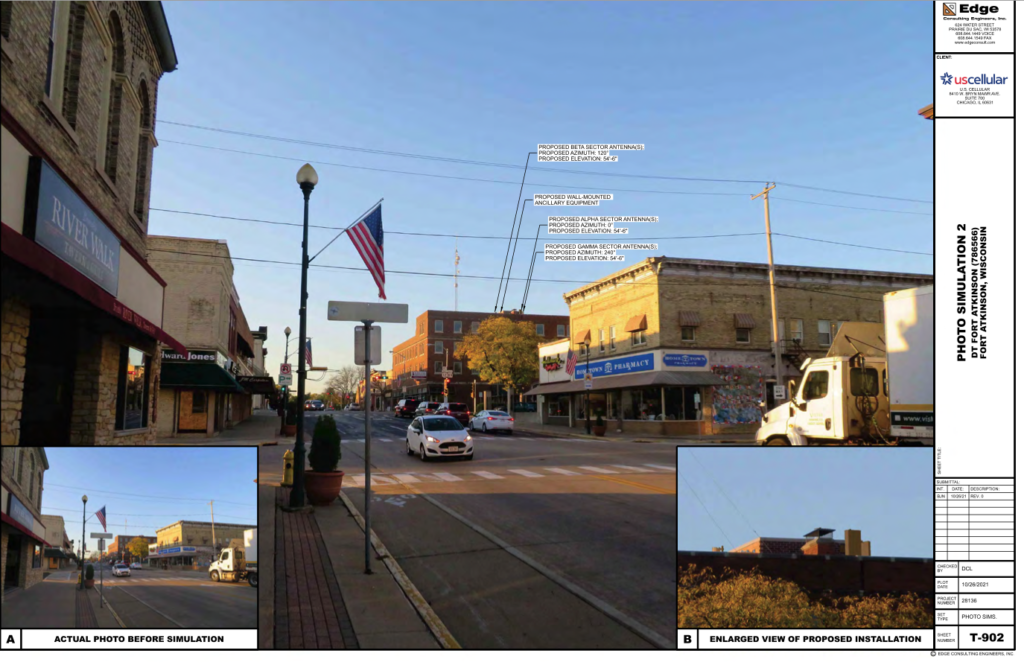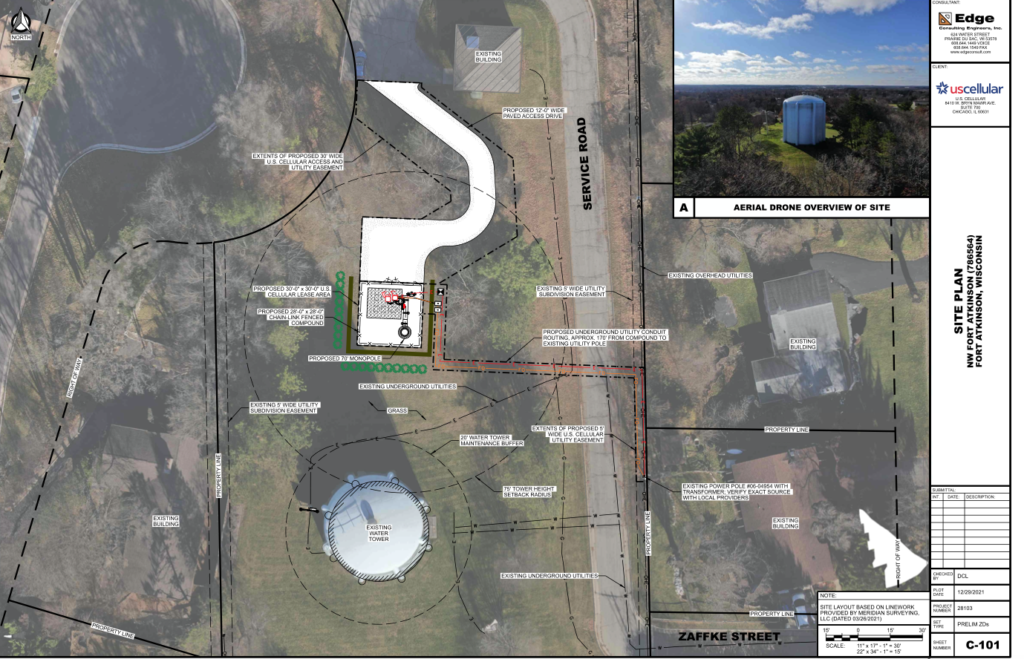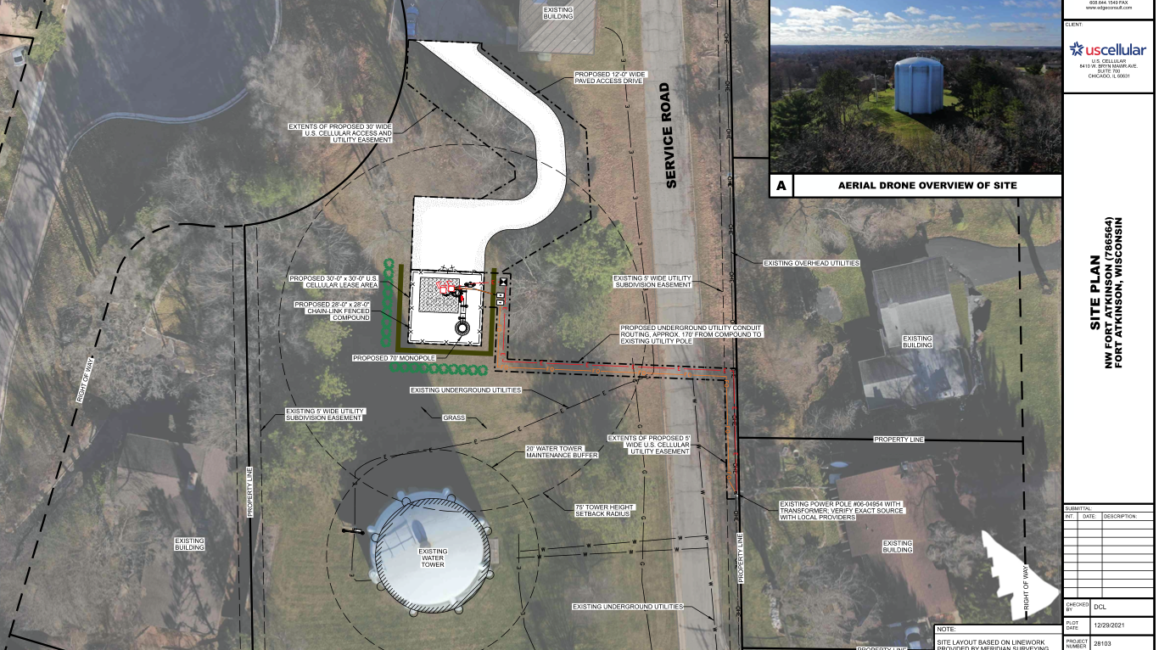By Chris Spangler
The Fort Atkinson Plan Commission has approved installing wireless communication equipment atop a downtown senior residence, but has held off on giving the go-ahead for a cellular tower in a residential neighborhood on the city’s north side.
US Cellular LLC requested a conditional-use permit to place a wireless communications antenna and equipment atop the Black Hawk Senior Residence building at the corner of West Milwaukee Avenue and South Main Street.
The antenna will be mounted on the exterior walls of the elevator penthouse at the Black Hawk, which is located in the Downtown Historic Mixed-Use Zoning District.
The antenna’s purpose is to provide downtown Fort Atkinson with enhanced wireless access, according to officials.
The commission unanimously approved the request when it met on Tuesday, advancing it to the full council for its review.
However, the Plan Commission took no action on a second request by US Cellular, for a conditional-use permit to allow installing a monopole communications tower just north of the watertower at 711 Zaffke St.
Due to its elevation and location on the north side of the city, this site was identified as a good location for the proposed 70-foot monopole to provide better cellular and data coverage to the residents and businesses on the north side of the city, officials noted.
The watertower is a little more than 51 feet tall.
US Cellular has proposed installing the monopole tower in a fenced compound with outdoor cabinets to house the ground equipment on the city property that is zoned as Institutional.
City engineer and commission Secretary Andy Selle said that the original intention had been to attach the wireless equipment to the existing watertower, but that would have been “not quite ideal in terms of the loading on the watertower from winds, so it was shifted to a situation where a monopole would be erected and the antenna would be mounted on that.”
He said the location of the monopole was moved to the rear of the parcel to obstruct it from neighbors’ view “to the highest extent possible.”
The slope of an access road was reduced and plantings were included in the plans.
Attending the meeting via Zoom was Thaddeus Johnson, a project manager at GSS Inc. who represents US Cellular.
Building inspector Brian Juarez noted that the monopole meets zoning requirements, including those relating to color and setback from nearby residences.
During a public hearing Tuesday, several current and former neighbors of the so-called “Cloute Hill” site voiced opposition to installing the monopole there.
Sandra Free, 810 Messmer St., said that her backyard is located directly next to the proposed construction site.
“The proposed tower would change the character and feel of our neighborhood,” she said. “Fort Atkinson offers the best small-town living, peaceful and quiet quality of life. The construction of this tower asks the residents of our neighborhood to permanently sacrifice part of the term that attracted us to this neighborhood in exchange for the noise, pollution, service vehicles and unattractive view of the cellphone tower.”
She told the commission that Fort Atkinson residents “buy and build with confidence that the responsible planning and zoning will be respected. If the city fails to adhere to the zoning rules allowed by allowing the conditional use and erecting a cellphone tower in a residential neighborhood, this is in direct betrayal to the trust we place in our city to make decisions to protect its residents.”
Free said that there is sufficient land for the tower elsewhere, and that there is evidence that emissions from cellphone towers might affect health.
“By allowing this private company to erect this tower, it could potentially endanger the health and welfare of Fort Atkinson residents,” she said, adding that it also would negatively affect property values and interfere with neighbors’ use and enjoyment of their properties.
“I relish the peaceful time I spend every day on my deck, interacting with the birds and other wildlife that are drawn to this location due to the trees and the quietness and the open space,” Free stated. “We do not want to see this sacrificed in order to enable a cellphone company to increase their profits.”
Also addressing the commission was Betty Cloute, a Madison Avenue resident who used to reside at 818 Messmer St., right below the tower.
She said the location has been in her husband, Bob’s, family for generations.
“Bob was 4 years old when the house was built, one of only two in the entire subdivision. Now, their son, Eli, and Tammy Cloute, live there,” she told the commission. “We all have history on that hill.”
Cloute read a letter from Eli, who was unable to attend the meeting.
“I have five young children,” he wrote. “Common sense would tell me that cellphone waves coming through my house could be a potential risk to my children.”
He shared a long-ago memory of asking his grandfather, who built the house in which he resides, why so many people smoked. He was told that at the time, there was no proof that smoking caused cancer.
“He was right. It wasn’t until 1964 that the surgeon general gave an announcement that smoking causes cancer,” Eli Cloute wrote.
“Researching cellphone waves will give you the same types of stats,” he added. “You can find just as many professionals that say it is perfectly fine that say it is not. I’m asking that you do not allow this tower in my backyard.”
Bob Cloute went to the podium to offer a little background, as well.
“We were the third house to be built up there, actually before the watertower was put up there,” he recalled, noting that longtime City Manager Elmore Klement lived on “Cloute Hill” in 1958 as well.
“He always said we would have access to our backyard,” he said.
However, since the cellphone proposal surfaced, concrete barriers have been set up so neighbors can’t access their backyards, he told the panel.
“We offered to purchase the land behind our backyard to keep that access, but were turned down for that,” Bob Cloute said.
City Manager Rebecca Houseman LeMire told him the city would follow up on the access concerns.
Also speaking at the public hearing was Katie Oatsvall, 721 Zaffke St.
“We moved in about a year ago, and honestly, if there had been a celltower there, I don’t think I would have wanted to move in there,” she said.
“I have two young kids,” Oatsvall continued. “This is something that I, as a mom, want to protect them from, and so I just don’t agree with it being put in my backyard.”
She voiced concern about a celltower ruining the view, as well as it affecting nearby property resale values.
Viewing the meeting via Zoom, Dennis Stark, 814 Messmer St., said he has resided there almost 32 years,
“When we bought it, it was nice and peaceful and everything,” he said of the neighborhood. “We don’t see any enhancement to our property values by putting a tower back there.
“We’re concerned about the health risk,” he added. “Rockwell School’s not that far away. We don’t have little children anymore obviously … but I am concerned about other people in the neighborhood with children.”
Noting that he also is concerned about aesthetics and property values, Stark concluded, “I would also oppose what the city is calling an improvement to our neighborhood.”
When the commission reviewed the proposal after the public hearing, Johnson pointed out that the plan has provisions for additional landscape screening around the ground-mounted monopole and support building.
Responding to a commissioner’s question, he also explained how locations are selected.
He said he is hired by US Cellular to place some of its cell towers, having been given locations for cellular coverage by radio frequency engineers.
“They essentially tell me an area that needs to be covered and I do my best to try to find a suitable location for US Cellular to provide the service that they want to provide the community,” he said.
Anderson noted that data shows the north side of the city is a high-need area for wireless capacity needs, which is why the Zaffke Street location was chosen.
He said that he did look at multiple locations, including one close to the high school and State Highway 26 bypass and another closer to Rockwell Elementary School. However, none provided the adequate coverage necessary.
Commissioner Mason Becker asked if there are any cellphone towers in other residential neighborhoods. Selle said no.
Responding to a question by Commissioner Jill Kessenich, he said that another cellphone provider could lease space, as the monopole would have co-location capability.
Commissioner Eric Schultz asked if new cell coverage would allow, say, 5G.
Anderson said it would provide 4G, not 5G. The radio waves operate in their own sequence using the same technology as radios, just in different bands.
Meanwhile, the commission had received a background paper regarding cellphone towers by the American Cancer Society.
“Based on current data and existing research, this type of equipment doesn’t appear to pose health concerns,” Commissioner Davin Lescohier said, summarizing it. “At the same time, it’s also an area the cancer society would like to see additional research done going forward.”
Anderson responded to a question by Schultz by saying that the cellular towers make no noise.
“Windmills will generate a little bit of sound from the wind, but these cell towers do not generate any noise that you can hear,” he said.
As for service vehicle visits, outside the construction phase, a technician would be there only if there is a service outage and once per quarter for maintenance, Anderson said.
“Outside of that, it is an unmanned station,” he said.
Becker thanked the citizens who spoke during the public hearing.
“I just want to say that it’s not often that we get too many public comments at our Plan Commission meeting, so I appreciate that we could have some people from the neighborhood who expressed their concerns, and I do think we need to take those into consideration as we look into possibly moving forward with this,” he said.
“I understand it’s public property, but at the same time, there is a difference (between) the watertower which serves everybody’s needs, and a cell phone tower that potentially serves the needs of the people that subscribe to that service,” he added.
The commission chose not to act on the conditional-use permit for the Zaffke site at that meeting. It asked Anderson to return with a radio-frequency propagation map, a line-of-sight map showing the wireless coverage before and after a monopole; photos of what the tower would look like from neighboring residences; and additional information on tree replacement.
The Plan Commission meets on the second and fourth Tuesday of the month.
Meanwhile, a joint meeting of the Plan Commission and Fort Atkinson City Council will be held at 6 p.m. Tuesday, Feb. 1, at the municipal building and via Zoom.

The above photo, as shared with the Plan Commission, shows the location atop the Black Hawk Senior Residence building where a US Cellular wireless communications antenna and equipment will be placed. The Plan Commission approved a conditional-use permit for the project Tuesday.

The above site plan, as shared with the Plan Commission, shows placement of a proposed US Cellular monopole tower, including a fenced compound with outdoor cabinets to house ground equipment, placed just north of the city’s watertower at 711 Zaffke St. After listening to comments and concerns from residents living near the site, the commission chose not to act on the conditional-use permit, asking a US Cellular representative in attendance Tuesday to return to a future meeting with a radio-frequency propagation map, a line-of-sight map showing the wireless coverage before and after a monopole; photos of what the tower would look like from neighboring residences; and additional information on tree replacement.
This post has already been read 3548 times!
